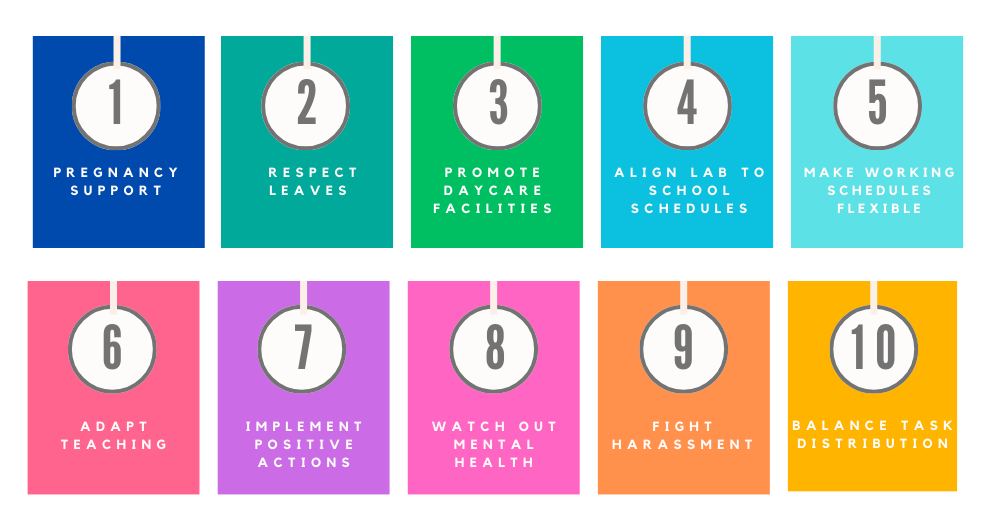International Women's Day 2024: Pioneering Change: A Bright Future for Mothers in Science
Published in Ecology & Evolution

Pioneering Change: A Bright Future for Mothers in Science

Esther Sebastián-González, Eva Gracia, Alejandra Morán-Ordóñez, Irene Pérez-Ibarra, Ana Sanz-Aguilar, Mar Sobral
The underrepresentation of women, especially mothers, in the higher steps of scientific research, is a pressing issue that the academic community is poised to address. We stand at a crucial juncture, where the convergence of awareness and action can catalyze significant progress toward gender equality in science. This is a hopeful beginning, but it is just that—the beginning.
The gradual attrition of women throughout their scientific careers, particularly post-maternity, is a systemic failure that academia is ready and capable of rectifying. This is not about filling quotas or ticking boxes. It is about recognizing and harnessing the breadth of talent and perspective that women offer, ensuring that our scientific community reflects the rich diversity of society itself.
The challenge of motherhood in science is significant. The fact that a significant proportion of female scientists consider leaving their careers post-childbirth points to a need for a structural change—a change that benefits not just women but the entire academic system.
We envision a future where these challenges are met with robust support programs and policies that acknowledge and facilitate the dual roles of women as scientists and mothers. The ten strategic rules proposed for a mom-friendly academia are stepping stones to a more inclusive, and therefore productive, and innovative scientific community.
We are on the cusp of a transformative era in academia. By implementing these forward-thinking policies, we are not just accommodating women and mothers in science; we are inviting them to lead, innovate, and inspire. Together, we can look forward to a future where gender and maternity are not barriers to scientific achievement, and where the academic landscape is as diverse and dynamic as the world it seeks to understand.
We propose a series of recommendations to foster an inclusive and supportive environment within academic institutions for women, particularly those who have childcare responsibilities.
Firstly, we suggest establishing a robust support system that caters to both the physical and emotional well-being of pregnant researchers, including access to mental health services and flexible work arrangements. We recommend the integration of childcare and lactation facilities within academic settings, enabling them to balance their professional and parental duties effectively. We advocate for the adaptation of academic schedules to align with school hours and promote remote participation, ensuring that parents do not have to choose between their careers and family life. We also advise modifying teaching practices to accommodate the needs of parent educators, such as offering flexible teaching schedules and online course options. We recommend the implementation of positive actions, including targeted funding opportunities and policy extensions tailored to support and retain women in the academic workforce. Recognizing the unique mental health challenges in academia, we emphasize the need for comprehensive mental health support and resources. Finally, we call for rigorous enforcement of anti-discrimination and harassment policies to cultivate a culture of respect and equality.
_____________________________________________________
Based on our article: Ten simple rules for a mom-friendly Academia. PLoS Comput Biol 19(8): e1011284.
Esther Sebastián-González, Department of Ecology, University of Alicante, Alicante, Spain
Eva Graciá, Department of Applied Biology, Miguel Hernández University, Elche, Spain, Centro de Investigación e Innovación Agroalimentaria y Agroambiental (CIAGRO-UMH), Miguel Hernández University, Orihuela, Spain
Alejandra Morán-Ordóñez, Institute of Earth Surface Dynamics (IDYST); Université de Lausanne, Lausanne, Switzerland, Institute of Ecology and Evolution (IEE) – Conservation Biology Division; Universität de Bern, Bern, Switzerland
Irene Pérez-Ibarra, Department of Agricultural Sciences and the Environment, University of Zaragoza, Zaragoza, Spain, AgriFood Institute of Aragón, Zaragoza, Spain
Ana Sanz-Aguilar, Animal Demography and Ecology Unit, IMEDEA CSIC-UIB, Esporles, Spain, Department of Biology, University of Balearic Islands, Palma, Spain
Mar Sobral, Universidade de Santiago de Compostela, Santiago de Compostela, Spain





Please sign in or register for FREE
If you are a registered user on Research Communities by Springer Nature, please sign in